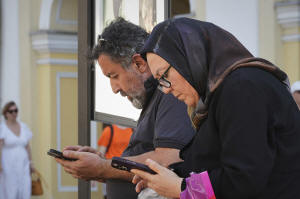Shutdowns of cellphone internet links sweep Russia, further limiting
already-stifled net freedom
[July 18, 2025]
By DASHA LITVINOVA
TALLINN, Estonia (AP) — A snappy tune by a blogger that mockingly
laments his poor internet connection in the southern Russian city of
Rostov-on-Don has gotten over a half-million views on Instagram in two
weeks.
“How to say you’re from Rostov without saying a word? Show one bar of
cellphone service," Pavel Osipyan raps while walking around the city,
smartphone in hand. "We have internet until 12 o'clock, and recently
there’s been no connection at all. No need to be angry, just get used to
it already.”
The complaints by Osipyan — unable to pay electronically for groceries,
or having to use paper maps while driving — aren't isolated to
Rostov-on-Don, which borders Ukraine and, as home to Russia's Southern
Military District, is targeted frequently by drones.
In the last two months, cellphone internet shutdowns, which officials
say are needed to foil Ukrainian drones, have hit dozens of Russian
regions — from those near the fighting to parts of Siberia and even the
Far East. Some Wi-Fi outages also have been reported.
Russians contacted by The Associated Press talked about card payments
not going through, taxi and ride-sharing apps not working properly, ATMs
that sometimes fail.
Experts point to the unprecedented nature of the measures and warn of
far-reaching consequences in a country where the Kremlin already has
significantly curtailed online freedom.
Such shutdowns in the name of security legitimize them to the public and
open the door for authorities abusing the restrictions, said Anastasiya
Zhyrmont, policy manager for Eastern Europe and Central Asia at the
Access Now digital rights group.

A signal to regional authorities
Experts say the trend began in May, when Russia celebrated the 80th
anniversary of the defeat of the Nazi Germany in World War II and
foreign dignitaries flocked to Moscow for a big military parade.
The capital suffered severe disruptions of cellphone connectivity to the
internet for days, and Kremlin spokesman Dmitry Peskov confirmed those
were deliberate restrictions due to regular Ukrainian drone attacks.
Asked how long they'd last, he replied, "This will be done as needed.”
Russia has restricted smartphone connectivity before, with isolated
instances during protests, as well as in regions bordering Ukraine.
Shutdowns in the capital, however, sent a signal to authorities across
the vast country that it’s a useful tool, said lawyer Sarkis Darbinyan,
founder of Russian internet freedom group Roskomsvoboda.
Ukraine’s "Operation Spiderweb” in early June, in which drones launched
from containers on trucks attacked airfields deep inside Russia, made
officials all the more eager to take action, Darbinyan said.
“They got really scared that drones now may appear, like a
jack-in-the-box, in any Russian regions,” he told AP.
By mid-July, deliberate shutdowns spread to most of the country,
according to Na Svyazi — Russian for “staying connected” — an activist
group tracking internet availability.
On Tuesday, the group reported cellphone internet shutdowns in 73 of
over 80 regions. In 41 of them, there were reports of broadband network
outages as well, while restrictions on broadband internet occurred in
six regions, while cellphone connections were fine.
Some regional officials confirmed that cellphone internet was restricted
for security reasons. Nizhny Novgorod Gov. Gleb Nikitin said this month
the measure will stay in place in the region east of Moscow for “as long
as the threat remains.”
Asked Thursday whether such mass shutdowns were justified, Peskov said
“everything that has to do with ensuring the safety of citizens,
everything is justified and everything is a priority.”
Unpredictable disruptions
Russians from affected regions say the outages can last for hours or
days; patterns also are hard to discern, with service working in one
part of a city but vanishing elsewhere.
In Voronezh, near Ukraine and frequently targeted by drones, one
resident said she felt like she was in “a cave” in early July with no
cellphone internet or Wi-Fi in her home. The woman, who spoke to AP on
condition of anonymity because of security concerns, said she was only
able to get online at work the next day.
[to top of second column]
|

Pedestrians pause to look at their phones in St. Petersburg, Russia,
on Monday, July 14, 2025. (AP Photo/Dmitri Lovetsky)

Cellphone internet in the southwestern city of Samara "goes out at
the most unpredictable moments,” said Natalia, who also spoke on
condition that her last name be withheld for safety reasons. Her
home Wi-Fi recently also has slowed to a near halt around 11 p.m.,
staying that way for a few hours, she said.
Connectivity has improved recently in the Siberian city of Omsk,
said Viktor Shkurenko, who owns retail stores and other businesses
there. But cellphone internet service was out in his office for an
entire week. A few of his smaller stores that rely on cellphone
networks suffered disruptions, but nothing critical, he said.
“I don’t feel any super strong discomfort," said Grigori Khromov of
Nizhny Novgorod, Russia’s fifth-largest city where regular and
widespread shutdowns were reported. "I have an office job and I work
either at home or in the office and have either wire internet or
Wi-Fi.”
In rural areas, small towns and villages, where cellphone internet
often is the only way to get online, the situation was harder to
gauge.
Pharmacies in such areas have struggled, Russian media reported and
the Independent Pharmacies Association confirmed to AP. Viktoria
Presnyakova, head of the association, said in a statement that
prescriptions must be logged in special software, but that becomes
impossible without an internet connection for weeks.
A social media user in the Belgorod region bordering Ukraine
complained on Gov. Vyacheslav Gladkov’s social media page that
without cellphone internet and a working alarm system, village
residents have to bang on a rail to warn neighbors of an attack. The
authorities promised to look into improving connectivity in the
area.
Authorities elsewhere also announced steps to minimize disruptions
by opening Wi-Fi spots. They also are reportedly planning to
establish an agency to coordinate the shutdowns, according to
Izvestia, a Kremlin-backed newspaper that cited unidentified
government sources. Peskov said he was unaware of the plan.
Russia's efforts at internet control
Russian and Ukrainian drones use cellphone internet networks to
operate, so shutdowns are one way authorities try to counter the
attacks, said Kateryna Stepanenko, a Russia analyst at the
Washington-based Institute for the Study of War.
But it's also part of the Kremlin's long-term effort to rein in the
internet. Authorities have actively censored online content in the
last decade, blocking thousands of websites of independent media,
opposition groups and human rights organizations.

After Russia's full-scale invasion of Ukraine in 2022, the
government blocked major social media like Twitter, Facebook and
Instagram, as well as encrypted messenger platform Signal and a few
other messaging apps.
Access to YouTube — wildly popular in Russia — was disrupted last
year in what experts called deliberate throttling by the
authorities. The Kremlin blamed YouTube owner Google for not
properly maintaining its hardware in Russia.
State internet watchdogs routinely block virtual private network
services that help circumvent the restrictions, and there are plans
to introduce a national messenger app, expected to replace foreign
ones.
Along with the shutdowns, these are part of a larger campaign “to
establish control over the internet, which is something the Kremlin
had failed to do 20 years prior on the same level that China did,”
said the ISW's Stepanenko.
Access Now's Zhyrmont says it's “very disturbing” that Russians have
gotten used to living with growing internet restrictions, including
shutdowns.
“This shouldn't be modern reality,” she said.
All contents © copyright 2025 Associated Press. All rights reserved |